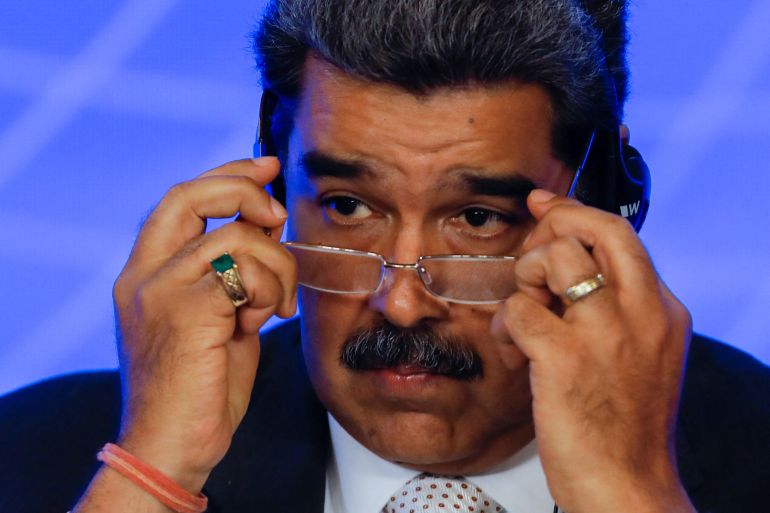Venezuela using arbitrary detention as ‘tool of repression’: Amnesty
Rights group accuses Nicolas Maduro’s government of detaining people for political reasons, urges immediate release.

Venezuelan President Nicolas Maduro’s government continues to use arbitrary detention to crack down on political opponents, Amnesty International has said, calling on Caracas to release all detainees.
In a report on Tuesday, Amnesty documented the cases of people it said were “victims of politically motivated arbitrary detentions” between 2018 and 2022, including teachers, trade unionists and human rights defenders.
Keep reading
list of 3 itemsWhy are Venezuelan refugees disappearing in Colombia?
Mass arrest at LGBTQ club in Venezuela prompts outcry over discrimination
The detainees were arrested due to their political activism, for gender reasons, or as a result of ties to people “considered suspicious” by the government, the group said.
“The evidence shows that Nicolas Maduro’s government’s policy of repression and the human rights crisis continue to jeopardise the rights to life, liberty and protection from harm in Venezuela,” Erika Guevara-Rosas, Amnesty’s Americas director, said in a statement.
“Arbitrary detentions cannot continue to be a tool of repression and social control by the government,” she added.
Rights groups have said approximately 300 people are being held as political prisoners in Venezuela and the United Nations and other international bodies have documented arbitrary detention and rights abuses for years in the South American nation.
In September 2022, a special UN mission to Venezuela said the country’s intelligence agencies “made use of sexual and gender-based violence to torture and humiliate their detainees” since at least 2014 and “the violations and crimes … continue to this day”.
The Venezuelan government rejected the accusations as “false and unfounded”.
Venezuela is a “democratic and social state, based on the rule of law and justice, which is committed to the promotion, respect and protection of human rights”, the government said at the time.
On Tuesday, Amnesty International identified patterns in the detentions that included arrests without warrants, a “lack of judicial independence”, use of “ambiguous” laws, and “incommunicado detention and isolation of detainees”.
The imprisonments were meant to send a “message of intimidation, often aimed at family members or people close to those who are being repressed”, the group said.
One highlighted case was that of Javier Tarazona, founder of the FundaRedes rights group, who was arrested in 2021 and charged with “terrorism” after accusing the Maduro government of links to the National Liberation Army (ELN), a Colombian rebel group.
Amnesty called on Venezuela to release all political detainees and urged the international community to demand guarantees to prevent such practices from being repeated.
It also called on the International Criminal Court (ICC) to include the cases in its investigation into alleged crimes against humanity committed by Maduro’s administration.
The ICC said in June that its prosecutors could resume their probe after the effort was suspended at Venezuela’s request in April of last year to allow the country to conduct its own investigation.